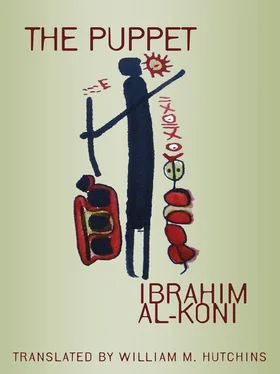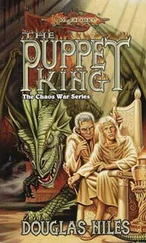Ibrahim al-Koni - The Puppet
Здесь есть возможность читать онлайн «Ibrahim al-Koni - The Puppet» весь текст электронной книги совершенно бесплатно (целиком полную версию без сокращений). В некоторых случаях можно слушать аудио, скачать через торрент в формате fb2 и присутствует краткое содержание. Год выпуска: 2015, Издательство: Center for Middle Eastern Studies, University of Texas, Жанр: Современная проза, на английском языке. Описание произведения, (предисловие) а так же отзывы посетителей доступны на портале библиотеки ЛибКат.
- Название:The Puppet
- Автор:
- Издательство:Center for Middle Eastern Studies, University of Texas
- Жанр:
- Год:2015
- ISBN:нет данных
- Рейтинг книги:3 / 5. Голосов: 1
-
Избранное:Добавить в избранное
- Отзывы:
-
Ваша оценка:
- 60
- 1
- 2
- 3
- 4
- 5
The Puppet: краткое содержание, описание и аннотация
Предлагаем к чтению аннотацию, описание, краткое содержание или предисловие (зависит от того, что написал сам автор книги «The Puppet»). Если вы не нашли необходимую информацию о книге — напишите в комментариях, мы постараемся отыскать её.
The Puppet — читать онлайн бесплатно полную книгу (весь текст) целиком
Ниже представлен текст книги, разбитый по страницам. Система сохранения места последней прочитанной страницы, позволяет с удобством читать онлайн бесплатно книгу «The Puppet», без необходимости каждый раз заново искать на чём Вы остановились. Поставьте закладку, и сможете в любой момент перейти на страницу, на которой закончили чтение.
Интервал:
Закладка:
“But. …”
“You’ll depart tomorrow with the first caravan.”
Somewhere to the east, from the vicinity of the scarecrow’s eerie figure, they heard a muffled sound: a suppressed, gloating laugh. Or perhaps the opposite: sobs bottled up in a chest or a phrase that had died in the throat turning into a mysterious cry. All sounds resemble each other when restrained. All contradictions resemble each other and harmonize when the subject is confused.
______________
3. Tadrart Acacus and Tassili n’Ajjer, Saharan mountain ranges both recognized as UNESCO World Heritage sites because of the prehistoric rock art found there.
4. In Tuareg folklore, the moon is a representation of the goddess Tanit, and during different phases of the moon and eclipses she is seen as being attacked by enemies.
THE PURSE
1
In the commodities market he watched the man with two veils converse with a merchant from a caravan that had just arrived in the oasis. He asked himself at once, “I wonder what language merchants speak? Are they past masters of the language of circumlocution and indirection like desert people? Does jargon flow from their tongues — as with the people of other professions?” He realized that he had never debated merchants before. It astonished him that he was only discovering this now.
He passed a group of men who were struggling with camels laden with bundles. Livestock were stirring up dust with their hooves. In the air were diffused the smells of spices, camel dung and urine, perfumes, and dried fruit from lands to the south and north. These made him feel dizzy, because he was accustomed to recalling with each scent a murky inspiration, even if it vanished in a flash. The blend of scents today, however, far from awakening any illumination, made him feel nauseous and dizzy.
As the sun sank in the west, the walls’ shadows stretched toward the east. Beyond the walls, the bleating of flocks returning from their pastures could be heard.
He stopped after several paces. The man with two veils faced his companion at times, wagging his index finger, and then bent over a sheet of leather in his other hand, while the piece of linen covering the lower half of his head shook. Then he would nod his head again to return to the animated conversation.
He advanced several steps closer and gestured with a jerk of his head toward the man, who paid no attention. He looked at him without seeing him, like someone with a troubled heart.
He took another step closer and waved at him insistently. Then the man finally stopped his chatter and approached with a troubled gait. He thought he would start with a joke. “I circled the two of you repeatedly and tried to attract your attention several times, but businessmen seem to blot out the rest of the world when together.”
“Merchants can forget the world’s existence but never that of rulers.”
“Do businessmen have such a high regard for rulers?”
“In commerce, there is no place for high regard, master, but merchants venerate the authorities more than anyone else, because they know that commerce can’t exist in a power vacuum.”
“The oasis’s leader is happy to hear this from the chief merchant, but tell me about caravans. Tell me about market conditions.”
They walked west, encountering herds of sheep, goats, and camels with their herdsmen. Trails of dust rose from the twilight horizon, and in the open countryside shepherds’ shouts mingled with the grumbling of choice camels and the bleating of wretched goat kids.
They turned south to avoid the herds and headed toward the fields. The man with two veils said, “Despite our worries, master, commerce is the noblest craft man has devised.”
“Really?”
“I’ll tell you the truth, master. If commerce didn’t exist, death would be a hundred times easier than life.”
“It’s that significant?”
“I often spy on dolts who live quietly. I’m astonished they don’t die of loneliness.”
“If we ask these people about the mercantile life, they’ll express their amazement that you all don’t die from disorientation.”
“They say that, master, because they haven’t experienced commerce’s enchantment.”
“And they say you’re opposed to asceticism because you haven’t experienced the bliss of tranquility.”
“Nonsense, master. They say the ugliest things about us, assuming that we engage in business solely to make money.”
“Is there any point to business besides making money?”
“The fact is that making money is a single loop in a chain seventy yards long.”
“Amazing!”
“The charm of commerce doesn’t reside in the accumulation of profits but in a secret totally distinct from profit, master.”
“Amazing!”
“We compete to reach this secret — not from a desire to achieve the security we imagine we earn by gaining control of a larger stash of treasures.”
“Could I learn something about this secret?”
“If the tongue, master, were capable of disclosing this secret, that would make the matter much easier. Your slave, master, will give you half the riches he has spent decades accumulating, but how impossible. …”
“What can’t the tongue disclose?”
“The tongue, master, is an organ that wasn’t created to disclose information about secret mysteries. It was thrust between our jaws to veil intentions and to hide our secrets in the most remote recesses.”
“I’m hearing this insight for the first time today.”
“Allow me to ask my master why a beautiful woman captivates us? How can beauty rob us not only of our dignity but of our common sense as well? What’s beauty’s secret, master?”
“Don’t expect me to say that it resides in the body, because I’ve seen as many beautiful women in my life as there are pebbles beneath your feet and have embraced half of them. But I only lost my senses when I met the she-jinni for whose sake I fought my comrade, the hero. I discovered in her eyes, and perhaps in her voice, the lethal sign you call a secret.”
“Will it satisfy my master if I tell him commerce is like a beautiful woman? Dolts love her physical appearance. Fools are enamored of what they can see of her with their blind eyes, but the hidden aspects of her body and the veiled characteristics of her appearance are perceived only by lovers of a different stamp, lovers who don’t want from commerce what she gives everyone, what she provides to amateurs, adventurers, and lucky individuals. They search for something more and pursue another secret, another treasure, greater than any other, but the miserly creature knows how to protect her treasure with a thousand talismans. Thus only disciples who pursue her for a long time will find their way to it. Only one who has shown exemplary loyalty, devoting his entire life to her, will find the path.”
“Is there anything in the desert that’s worth giving our lives for?”
“Yes, master: pursuit, exploration, and happiness.”
“Happiness?”
“Yes, master. Commerce is good news for each day, and good news is a single day’s happiness.”
“Doesn’t the good news turn bitter when a contract results in a loss?”
“When a contract results in losses, good news turns bitter only in the hearts of amateurs, adventurers, and lucky people. The true merchant, the businessman who has perfected his game, laughs his head off over a loss, because he knows that loss is only a sign that inevitably precedes good news. In exactly the same way, the wise jackal fills the valleys with mournful howls after eating its fill, because it knows from experience that hunger inevitably follows satiety, and fills the valleys with laughter when hungry, because it knows from experience that repletion inevitably follows hunger. The true merchant, master, understands game theory. He celebrates a day of loss and similarly is delighted by an era of glad tidings. Game theory is a second secret of commerce. Commerce, master, is like life. A person doesn’t profit from it until he has lost repeatedly.”
Читать дальшеИнтервал:
Закладка:
Похожие книги на «The Puppet»
Представляем Вашему вниманию похожие книги на «The Puppet» списком для выбора. Мы отобрали схожую по названию и смыслу литературу в надежде предоставить читателям больше вариантов отыскать новые, интересные, ещё непрочитанные произведения.
Обсуждение, отзывы о книге «The Puppet» и просто собственные мнения читателей. Оставьте ваши комментарии, напишите, что Вы думаете о произведении, его смысле или главных героях. Укажите что конкретно понравилось, а что нет, и почему Вы так считаете.












